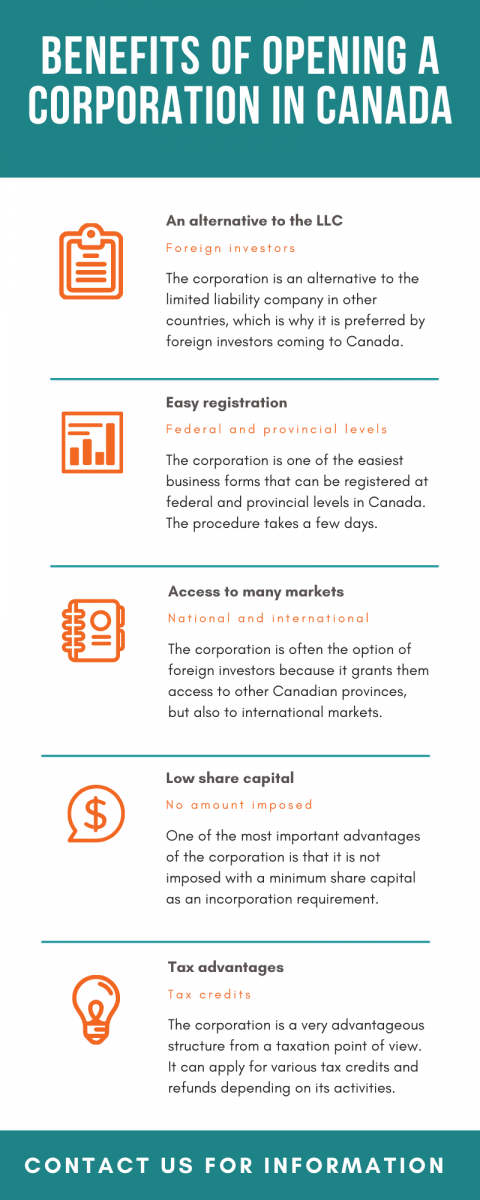A corporation is a preferred business form in Canada, just like limited liability companies are chosen for incorporation in numerous countries worldwide. Because LLCs are not available in Canada, foreign investors can set up corporations that present the same attributes as LLCs. In compliance with the Canadian legislation, our specialists in company formation in Canada are able to offer assistance and guidelines for all entrepreneurs who want to register a company in Canada, whether as residents or non-residents.
| Quick Facts | |
|---|---|
| Types of companies in Canada |
– Canadian controlled private corporation, – public corporation, – corporation controlled by a public corporation/ other corporation |
|
Minimum share capital for corporation |
No capital requirements are imposed when setting up a corporation in Canada. |
|
Minimum number of shareholders for corporation |
In order to set up a corporation in Canada it is necessary to have minimum 1 shareholder. |
| Time frame for the incorporation (approx.) |
1-5 business days |
| Corporate tax rate |
– 38% standard corporate tax rate, but with the federal tax abatement and the general tax reduction, it can be reduced to 28% and 15% respectively. – lower rates are also avaiable in the Canadian provinces |
| Dividend tax rate |
– 15% (non-eligibile dividends), – 38% (eligible dividends) |
| VAT rate |
– 5% standard VAT rate (charged at a federal level), – 13-15% at a provincial level |
| Number of double taxation treaties (approx.) | 94 |
| Do you supply a registered address? |
Yes |
| Local director required to set up a corporation in Canada | Residency requirements can apply in certain Canadian provinces, while others do not impose any restrictions (for example Ontario). |
| Shelf company available |
Yes |
| Redomiciliation permitted |
Yes |
| Electronic signature |
Yes |
| Is accounting/annual return required to set up a corporation in Canada? |
Yes (both) |
| Foreign-ownership allowed | Yes, but there are some limitations for certain industries. |
| Any tax exemptions available? |
There can be some tax exemptions stipulated by the tax law in Canada and the tax treaties. They can also vary based on the Canadian province (they can be applied to the corporate income tax, the dividend tax, management fees, etc.) |
| Tax incentives |
– tax deductions, – tax credits, – tax refunds (individuals can also benefit from various tax incentives). |
The main types of corporations in Canada
The Company Law provides for the corporation to be registered at a federal and provincial level. Corporations represent the main types of entities in Canada, however, there are also other types of legal structures that can take the form of a corporation. Among these, we mention the non-resident company and the extra-provincial corporation.
If you are interested in starting a business in Canada and consider the corporation as your go-to business form, our local specialists can help you.
Please know that the corporation must be registered for tax purposes in 2024, considering that the main purpose for its registration is to develop commercial activities that are taxed following the Canadian law. Thus, it is mandatory to register the legal entity with the Canadian Revenue Agency.
You must also observe the obligations you may have for obtaining business permits and licenses (their type can vary in accordance with the types of business operations you plan to develop in Canada in 2024). We also mention that the requirements for the incorporation can slightly vary based on the Canadian province of choice. However, the main rules that must be followed for the incorporation of this legal entity derive from the Canada Business Corporation Act.
Steps in opening a corporation in Canada in 2024
A corporation in Canada can be set up in one of the 13 jurisdictions (provincial and territorial) in the country or at the federal level. The Canada Business Incorporations is in charge of registering the companies and the authority which issues the registration certificate of a firm. Here are the main requirements one should consider when registering a corporation in Canada:
• reserve a distinctive name for the corporation – the name can also be a number issued by the Trade Register;
• draft, notarize and submit the Articles of Association with the federal or provincial Trade Register;
• provide information, such as identification papers, about the owners of the Canadian company;
• submit documents of the business location, such as the address of the company;
• appoint the managers of the corporation – their personal information must also be filed with the Trade Register;
• open the company’s bank account and deposit the share capital of the business;
• prepare the corporate seal – it must also be submitted with the Companies Registrar upon incorporation;
• register for tax purposes, obtain a VAT number and register for social security and employment purposes.
In addition to the documents and requirements mentioned above, a corporation cannot be set up without a minute book which needs to comprise the directors’ register, a copy of the Articles of Association, securities register, the resolution of managers and the share transfer register. Our Canadian company formation agents are able to offer complete support in drafting the documents for your corporation in Canada.
The Articles of Association of a Canadian corporation
The Articles of Association are the most important documents when setting up a corporation in Canada. These must contain the following information:
- who the shareholders and the company directors are as well as their duties and rights;
- the number of shares issued by the company and their allotment to the shareholders;
- the types of shares to be issued by the company and if any restrictions apply;
- the activity or activities which will be undertaken by the Canadian corporation;
- other clauses and specific information that the shareholders want to mention.
Choosing the place of registration of the Canadian corporation
Unlike other jurisdictions which provide for the same company incorporation procedures on the entire territory of the country, Canada is slightly different because there are three main categories of business formation procedures: the federal one, the provincial/territorial one and the mixt one, which allows a company to operate in one or more provinces, but also at a federal level. So, the first step to consider, after deciding to set up a corporation in Canada, is to choose where it will be registered.
In the case of local investors, the jurisdiction of the incorporation is the home of the shareholder(s), however, foreign investors must select the jurisdiction on different criteria. Among these, we recommend they consider the taxation level and the licensing requirements. It should also be noted that the registration of a corporation at a federal level is a little more expensive, however, it offers the possibility of providing services or selling goods on the entire Canadian territory.
A federally incorporated corporation must be registered in accordance with the Business Corporations Law and will be required to obtain extra-provincial licenses when seeking to operate in another province or territory.
Our company formation agents in Canada can offer more information on how to choose the local jurisdiction to set up a corporation. Our accountants in Canada are also at your service.
You can read more about the creation of a corporation in Canada in the scheme below:
Business number or corporate name for the Canadian corporation in 2024
The Canadian legislation allows companies, no matter their structure, to use business numbers or corporate names to represent them. The difference between these is that the business number is issued by the Trade Register, while the trading name must be reserved by the shareholders. An important aspect to consider when registering a Canadian corporation with a trading name is that the selected name must be unique at both the federal level and in the province the company will operate.
The following rules apply when choosing a business name for a corporation in Canada:
- the business owner is required to ensure the selected name is unique;
- the name must not be offensive to the general public;
- the name can be in English or French, however, it is possible to use both versions;
- the name must end with Corp. short from Corporation.
Our local consultants can advise on the registration of a corporate name or obtaining a business number for a Canadian corporation.
The registered address of a Canadian corporation
While in most countries the registered address is the legal seat of the company, in Canada, the registered address of the corporation will also imply the place where its corporate records are stored. Also, all official documents will be directed to this address. For such purposes, a registered agent can be appointed.
When using the services of such an agent, the investor must make sure he or she complies with the local regulations.
When registering the corporation, the business owner must state the proposed trading name, the exact address of the registered office and complete information about the directors of the company. It is very important to state if the directors are Canadian residents or not. We offer registered agent services for federal and extra-provincial corporations.
The corporate minute book of a Canadian corporation in 2024
Once the certificate of registration of the corporation has been received, the next step is to determine and organize the structure of the company. We mention that the organization of the corporation involves written documents which are kept in a corporate minute book. Such documents are prepared and presented in a meeting held by the stockholders and the managers of the corporation.
Register for a federal business number
Each corporation must register for the federal business number which is used for tax purposes by the financial authorities. For example, the federal business number will be verified for federal corporate income taxes and payroll source contributions. Furthermore, a corporation in Canada must register any non-corporate business name different from the name of the company which will be used in the province in which the activities take place. Please consider that this requirement is mandatory.
Please watch our video on how to set up a corporation in Canada:
Taxation of corporations in Canada
All Canadian companies must register for the Goods and Services Tax (GST) and taxation with the Revenue Agency. When it comes to the corporate tax, the following must be considered:
- the federal tax rate is set at 38% of the taxable income, however, thanks to the tax abatement, the rate is lowered to 28%;
- a general tax reduction is also available which generates a net tax of 15%;
- Canadian corporations registered as small businesses benefit from a federal corporate tax of 9%;
- provincial corporate taxes are levied at rates ranging between 0% and 16%.
With respect to the GST in Canada, the standard rate is 5%, however, each province and territory imposes a Harmonizes Sales Tax (HST) or a Provincial Sales Tax (PST), each at its own rates. The GST registration threshold depends on the legal entity the company operates under.
How long does it take to register a corporation in Canada?
The time frame for registering a corporation in Canada is detailed below:
- preparation of the incorporation documents – 1 day;
- business name reservation – 1 day;
- filing the incorporation documents – 1 day;
- tax and VAT registration – a few hours.
Characteristics of public corporations in Canada
The name of this business form is related to the fact that it can trade its shares to the public. The Canadian public company can offer its shares for sale on the Stock Exchange. Not all the shares must be listed, as this type of company can issue several classes of shares, out of which only one needs to be traded in order for the company to become public.
A Canadian company can also become a public corporation if, at the end of the financial year, it respects the provisions of Regulation No. 4800 within the Income Tax Act.
Canadian subsidiaries can also be or become public corporations if they are established or controlled by other public companies. You can ask our company registration consultants in Canada about the conditions related to opening a public corporation.
The shareholders of a public corporation in Canada
The Company Law provides for the same conditions for opening a private and public corporation in Canada, including in the shareholding structure of the business. This means that the public company only requires a shareholder as a founder of the business.
The public company, however, can also admit other shareholders through the sale of shares or listing the shares on the Stock Exchange. There is no maximum number when it comes to the shareholders of a public corporation in Canada.
Our company registration agents in Canada can offer more information on the rights and obligations of public corporations.
The share capital of a Canadian public corporation
One of the most important advantages of opening a public company in Canada is that there is no minimum amount of money required as a share capital for the corporation. However, the company will need to have a stated share capital which has to be mentioned in the company’s statutory documents and a paid-up capital which will be the amount of money deposited by the founders in the company’s bank account. The share capital can be altered, meaning that it can be increased or decreased.
Our local representatives can offer more information on the share capital requirements of a public corporation in Canada. We can also assist with the opening of a corporate bank account.
How to register a public corporation in Canada
The incorporation of a public corporation in Canada is subject to the same requirements as a private company and implies the following steps:
- drafting the company’s Articles of Association which must state the type of business form;
- opening a corporate bank account in which the share capital must be deposited;
- obtain a federal business number or reserve a trade name for the public company;
- register the company with the federal office or the provincial office of the Trade Register;
- obtain permits or licenses, depending on the activities or industry the company will operate in.
It must be noted that a private company can also be turned into a public company in Canada. This is possible through an initial public offering. If you plan on setting up a business in Canada and need guidance for the establishment of a public corporation, you can rely on our local advisors.
Why open a public corporation in Canada?
The public corporation is quite popular in Canada because of the advantages it offers. Among these are:
- it can be used for various purposes, among which initial public offering on one of the largest stock markets in the world;
- the public corporation can be entirely owned by foreign natural persons or companies;
- the founder(s) can decide on the paid-up share capital of the business, in accordance with their needs;
- the public corporation can be registered at the federal level and also can be registered at a provincial level at the same time;
- it can be used as a subsidiary company by foreign companies interested in placing their activities in Canada.
For extra information about how to register a corporation in Canada, we suggest you get in touch with our local company formation representatives.



